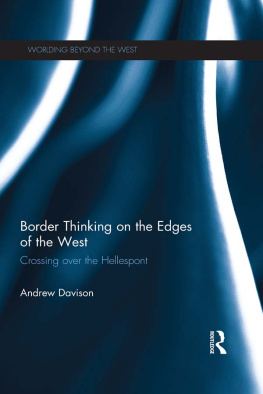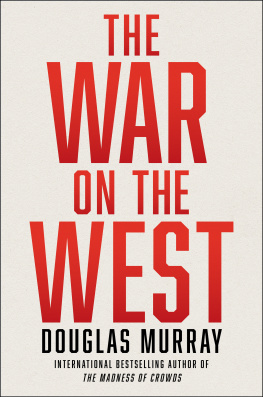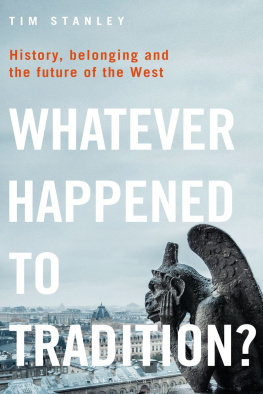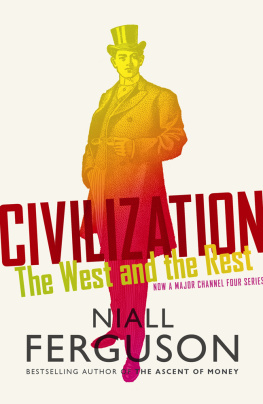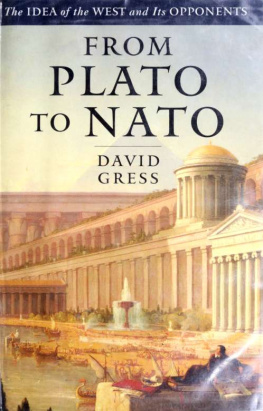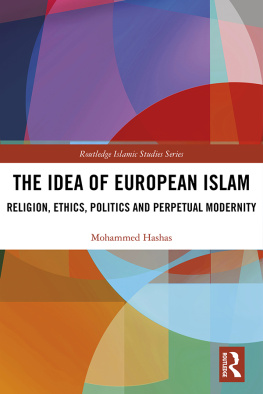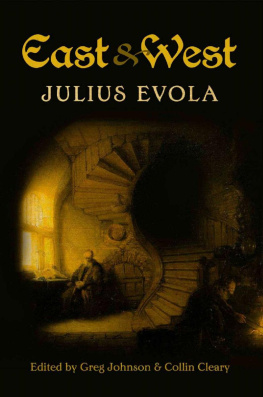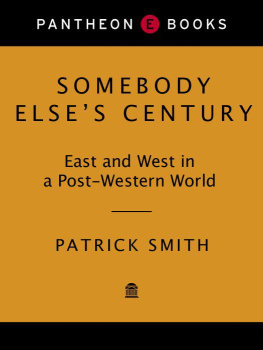The End of the West and Other Cautionary Tales
The End of the West and Other Cautionary Tales
Sean Meighoo
COLUMBIA UNIVERSITY PRESS
New York

Columbia University Press
Publishers Since 1893
New York Chichester, West Sussex
cup.columbia.edu
Copyright 2016 Columbia University Press
All rights reserved
Library of Congress Cataloging-in-Publication Data
Names: Meighoo, Sean, author.
Title: The end of the West and other cautionary tales / Sean Meighoo.
Description: 1 [edition]. | New York, NY : Columbia University Press, 2016. | Includes bibliographical references and index.
Identifiers: LCCN 2015041593 | ISBN 9780231176729 (cloth : alkaline paper) | ISBN 9780231541404 (e-book) | Subjects: LCSH: Civilization, Western. | Civilization, WesternPhilosophy. | Ethnocentrism. | PostcolonialismPhilosophy. | Continental philosophy. | CultureStudy and teaching. | PhilosophyHistory. | Intellectual lifeHistory. | Teleology. | East and West.
Classification: LCC CB245 .M434 2016 | DDC 909/.09821dc23
LC record available at http://lccn.loc.gov/2015041593
A Columbia University Press E-book.
CUP would be pleased to hear about your reading experience with this e-book at cup-ebook@columbia.edu.
Cover Design: Heads of State
References to websites (URLs) were accurate at the time of writing. Neither the author nor Columbia University Press is responsible for URLs that may have expired or changed since the manuscript was prepared.
To my parents, Cynthia and Peter Meighoo, for all the times that they have asked me when my book would be published
and to my partner, Deboleena Roy, and our children, Kheyal and Koan Roy-Meighoo, for all the times that they have made me stop to celebrate the slow and fitful progress of my manuscript with themthe celebrations, I hope, are not over yet.
Contents
Thanks to my colleagues at both Emory University and San Diego State University who have supported my work in one way or another during the past ten years, even if they have since come to regret it: Huma Ahmed-Ghosh, Peter Atterton, Deepika Bahri, Steven Barbone, Geoffrey Bennington, the late Rudolph P. Byrd, Kevin Corrigan, Jonathan K. Crane, Anne Donadey, C. Aiden Downey, Rosemarie Garland-Thomson, Sander L. Gilman, Jonathan Goldberg, Elizabeth Goodstein, Naama Harel, Lynne Huffer, John Johnston, Howard Kushner, Irene Lara, John Lysaker, Elissa Marder, Nolle McAfee, Andrew J. Mitchell, Michael Moon, William A. Nericcio, Walter Reed, Benjamin Reiss, Pamela Scully, Kimberly Wallace-Sanders, Chris Werry, Deborah Elise White, Cynthia Willett, Elizabeth Wilson, and Yanna Yannakakis.
Thanks also to Cecelia Cancellaro at Idea Architects for helping me with my book proposal, to Wendy Lochner and Christine Dunbar at Columbia University Press for walking me through the publishing process, and to both anonymous readers for their generous comments on my initial manuscript draft. And finally, thanks to the Emory College of Arts and Sciences and the Laney Graduate School for providing subvention funds to cover the indexing costs of this book.
A new ethnocentrism has recently become prevalent in certain intellectual quarters. But what is most striking about this new ethnocentrism is that it is presented as a critique of ethnocentrism. Over the course of the past century, the entire Western tradition has been subjected to a radical interrogation within continental philosophy. It has been claimed that underlying the search for truth that occupies all Western thought, from the ancient Greeks to modern European thinkers, is a profound ethnocentrism, an essentially Western ethnocentrism by which the culturally specific problem of truth is given universal significance. The end of an eraor to use both Martin Heideggers and Jacques Derridas term of preference, the end of an epochhas thus been declared. What is really at stake in the end of philosophy, the end of history, and even the end of man is the end of the West itself. Twentieth-century continental philosophy has been marked, then, by the turn from a historical teleology of the West to what I would call a negative teleologythat is, by the turn from a discourse that celebrates the historical and technological progress of the West to a counterdiscourse that laments its cultural and spiritual decline. More recently still, over the past few decades, this negative teleology has been reappropriated within postcolonial theory. Insofar as postcolonial theory endorses the radical critique of Western ethnocentrism that has been formulated within continental philosophy, it continues to rely on a teleological concept of the West, even if this concept now operates in a negative mode. The end of the West has thus become a fundamental precept of continental philosophy and postcolonial theory alike.
In this book, I want to argue that this radical critique of Western ethnocentrism presumes another form of ethnocentrismmore subtle, perhaps, but all the more persistent. For what this critique presumes is that there is a West to begin with. This Western tradition is ostensibly constituted by a continuous line of thought extending from the ancient Greeks to modern European thinkers, a tradition that has remained impervious to all non-Western traditions. What I would suggest instead is that this Western tradition has been punctured by innumerable points of contact with other intellectual traditions as well as by innumerable points of rupture within. In other words, there is no West, at least not in the sense in which it has been conceived as an altogether unique and distinctly privileged event or course of events within world history. Of course, this is also to say that there is no East or any other tradition in which we might situate ourselves completely outside the West, as it were. Neither East nor West can furnish the theoretical precepts for the critique of ethnocentrism that so many continental philosophers and postcolonial theorists have recently attempted to offer. It is in a double sense, then, that I have titled this book The End of the West and Other Cautionary Tales. In one sense, I want to extend the radical critique of Western ethnocentrism that has been so forcefully articulated within twentieth-century continental philosophy and postcolonial theory. But in another sense, I also want to question the intrinsically teleological concept of the West on which this very critique is premised. For if this declaration on the end of the West is to provide an effective critique of ethnocentrism, then it can no longer serve the purpose of establishing a new beginning for the concept of the West itself.
This book is divided into four parts, containing a total of six chapters in addition to this introduction and a short conclusion. In has become known as the Black Athena debate, an intellectual controversy that was initially sparked by the publication of the first volume of Martin Bernals multivolume work Black Athena. Bernal proposes not only that ancient Greek civilization was profoundly indebted to ancient Egyptian and Phoenician civilization but also that the modern theory of the Hellenic origins of Western civilization was itself an invention of nineteenth-century European scholarshipa theory, moreover, to which even the ancient Greeks did not subscribe. Following the appearance of the second volume of Black Athena, the collected volume Black Athena Revisited was published, comprising twenty essays in which Bernals work was sharply criticized for its allegedly poor scholarship and ideological agenda. A number of related publications have since appeared, including Bernals response to his critics, Black Athena Writes Back, as well as the third and last volume of
Next page

